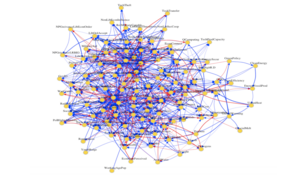Modeling Exploitable Conditions in the 21st Century Strategic Environment


SMA Anticipating the Future Operational Environment (AFOE) Computational Modeling Update
Speaker: Dr. Lawrence Kuznar (Chief Cultural Sciences Officer, NSI)
Date: 30 November 2022
Speaker Session Summary
SMA hosted a speaker session with Dr. Lawrence A. Kuznar (NSI) as part of its SMA “Anticipating the Future Operational Environment” (AFOE) Speaker Series.
The creation of a computational model that encapsulates the increasingly complex and overwhelming world as multiple systems that can be measured empirically could have strong implications for civilian and military decision makers. NSI Inc. and SMA are currently working on such a model that is expanding on prior research conducted by TRADOC G-2. NSI has expanded on TRADOC’s original 24 exploitable conditions to create the Global Exploitable Conditions Model (GECM) as part of the Anticipating the Future Operational Environment (AFOE) project for the US Joint Staff. Dr. Kuznar stated that while GECM is supported by a large corpus of qualitative research, a computational model has been built to empirically test it through network and system dynamics. GECM contains 17 subsystems that are comprised of 124 nodes and 829 edges where nodes connect. This model is the starting point for all of NSI’s research during the AFOE project.
The most important nodes in the GECM include civil war, terrorism, and energy costs. Dr. Kuznar emphasized that how frequently a node is discussed by the literature can influence its weighted importance in the model. The model identified nodes that are the strongest influencers and those most impacted by others. Several of these nodes—including terrorism and political polarization—are strong influencers and among the most influenced nodes at the same time. This overlap may present leverage points where an actor or government can influence how the system operates. It is also important for actors to consider the second and third order effects of nodes’ relationships. The GECM is designed to be tailored to geographic combatant commands, sub-regions, or single states. For example, by listening to USAFRICOM’s concerns, NSI was able to tailor the GECM to make the AFRICOM Exploitable Conditions Model (AECM). Dr. Kuznar concluded the presentation by identifying how NSI hopes the Joint Staff and the different combatant commands will use the findings from the GECM, including as a guide for wargaming efforts and a tool for identifying what data needs to be collected.
This speaker session supported SMA’s Anticipating the Future Operational Environment (AFOE) project. For additional speaker sessions and project publications, please visit the AFOE project page.
Dr. Lawrence Kuznar is NSI’s Chief Cultural Sciences Officer and conducts anthropological research relevant to counterterrorism and other areas of national security. His research ranges from advanced statistical and geographical modeling of social instability, to discourse analysis of adversaries including North Korea, China, Russia, Iran, and ISIS (Daesh) to provide leading indicators of intent and behavior. He has developed computational models of genocide in Darfur and tribal factionalism in New Guinea, mathematical models of inequality and conflict, and integrated socio-cultural databases for geo-spatial analysis of illicit nuclear trade and bioterrorism.
Dr. Kuznar’s recent research has been funded by academic sources, the Office of the Secretary of Defense Strategic Multi-Layer Analysis, Air Force Research Lab (AFRL), the Human Social Cultural Behavior (HSCB) modeling program of the Department of Defense, and by the US Army Corps of Engineers. He has also served on the HSCB Technical Progress Evaluation panel and a National Counterterrorism Center (NCTC) net assessment panel. He conducted extensive research among the Aymara of southern Peru and with the Navajo in the American southwest. Dr. Kuznar has published and edited several books and numerous peer-reviewed articles in journals such as American Anthropologist, Current Anthropology, Social Science Computer Review, Political Studies, Field Methods, and Journal of Anthropological Research. Dr. Kuznar earned his Ph.D. and M.A. in Anthropology, and a M.S. in Mathematical Methods in the Social Sciences from Northwestern University. His B.A. in Anthropology is from Penn State.

